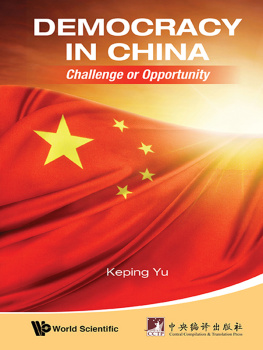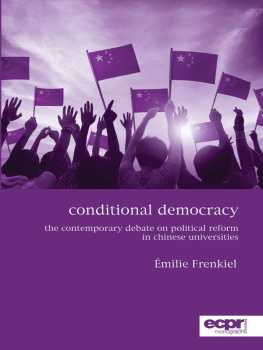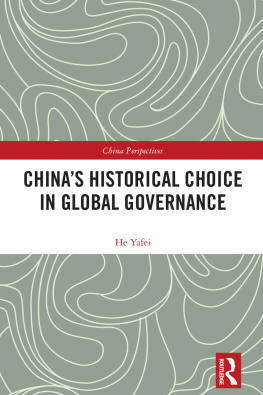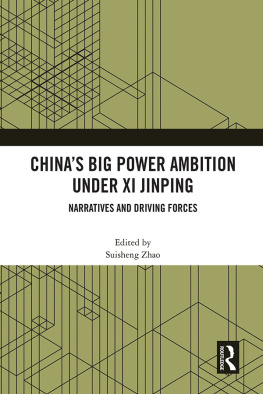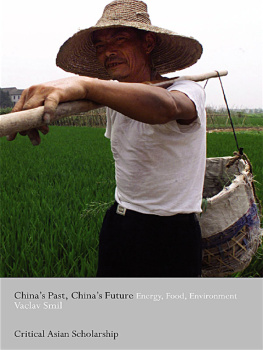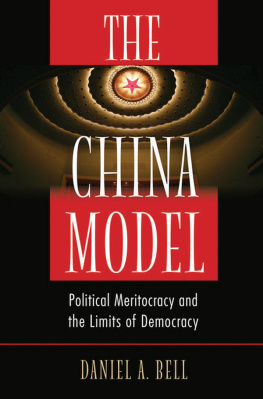Published by
World Scientific Publishing Co. Pte. Ltd.
5 Toh Tuck Link, Singapore 596224
USA office: 27 Warren Street, Suite 401-402, Hackensack, NJ 07601
UK office: 57 Shelton Street, Covent Garden, London WC2H 9HE
and
Central Compilation and Translation Press
Room 302B, Part B Hongru Building
#B-5 Chegongzhuang Street Xicheng
District, Beijing 100044, China
Library of Congress Cataloging-in-Publication Data
Names: Yu, Keping, author.
Title: Democracy in China : challenge or opportunity / Yu Keping.
Description: Hackensack, New Jersey : World Scientific, [2016]
Identifiers: LCCN 2015036860 | ISBN 9789814641524
Subjects: LCSH: Democracy--China. | Rule of law--China. | China--Politics and government.
Classification: LCC JQ1516 .Y79 2016 | DDC 320.951--dc23
LC record available at http://lccn.loc.gov/2015036860
British Library Cataloguing-in-Publication Data
A catalogue record for this book is available from the British Library.
This edition is jointly published by World Scientific Publishing Co. Pte. Ltd. and Central Compilation and Translation Press. This edition is distributed worldwide by World Scientific Publishing Co. Pte. Ltd., except China.
Copyright 2016 by World Scientific Publishing Co. Pte. Ltd. and Central Compilation and Translation Press
All rights reserved. This book, or parts thereof, may not be reproduced in any form or by any means, electronic or mechanical, including photocopying, recording or any information storage and retrieval system now known or to be invented, without written permission from the Publishers.
For photocopying of material in this volume, please pay a copying fee through the Copyright Clearance Center, Inc., 222 Rosewood Drive, Danvers, MA 01923, USA. In this case permission to photocopy is not required from the publisher.
Typeset in China
Printed in China
Preface
Democracy, governance and globalization are among the hottest topics in realpolitik for every single country in contemporary world. They are also the most important discourses in todays humanities and social sciences fields. However, whats democracy? Whats governance? Whats globalization? And what are their implications to humankind under todays historical context? What opportunities and challenges will they bring to all the countries across the globe? Different intellectuals and politicians have different or even conflicting answers to the aforementioned questions. Thus, a serious and scholarly analysis on these questions is both conducive to deepening social sciences researches and narrowing the substantial political differences among the people as well. This is exactly the responsibility for political scholars.
As a selection of important articles on democracy, human rights, governance and globalization by the author, this book not only highlights the authors answers to the aforementioned questions, but also presents the general ideas of the author, as a Chinese political scientist, on such hot issues like democracy, human rights, governance and globalization etc. From the perspective of political philosophy, the author examines some important concepts including human rights, democracy, governance, good governance, legitimacy, globalization and state sovereignty etc and dissects the delicate interrelations between human rights and democracy, democracy and governance, good governance and legitimacy as well as between globalization and state sovereignty. On the other hand, the author also discusses such important realpolitik issues including democracy, human rights, new immigration, citizenship, state governance, populism and state sovereignty in contemporary China and the debate on China Model thesis as well.
Composed with three separate parts as Democracy, Governance and Globalization, this book includes 11 articles altogether. All these articles have been published in Chinese, but their English version, for the most part, is brand-new. The author is indebted to those who have contributed to the publication of the book in general and the translators and English editors in particular. Special thanks to Dr. Yan Jian and Dr. Hou Tianbao, who did invaluable and irreplaceable assisting work during the process. The author is honored to have this book being sponsored by the National Publishing Fund for Translated Chinese Works.
Yu Keping
May 26, 2015
Contents
Part I
Democracy
1
Human Rights and Democracy
For hundreds and thousands of years, great thinkers have devoted their energies to understanding politics. The output and contribution of this body of work has been very great: we understand a lot about the underlying patterns of political development, we have accumulated a large body of knowledge of political science, and we have many accepted truths regarding political life. This has been of great service to humanity in the pursuit of ever better political systems and ever greater social progress. Here, I want to discuss some of the most important truths of political science, and I will particularly emphasize a number of long-neglected political truths. Four of these are most important: firstly, humanity has a set of common basic political values. Secondly, appropriate political systems are needed if these values are to be realised. Thirdly, to date, democracy is the best political system we have. Fourthly, there are a set of objective standards by which we can evaluate how democratic political systems are.
1. Human Rights Are a Basic Political Value
Simply stated, human rights are those basic rights which all persons possess, or ought to possess. All persons refers to all people in society, irrespective of their race, colour, sex, language, religion, political views, nationality, family status, wealth, education, ability, etc. Calling these rights signifies that they are demands individuals make of governments or societies, not vice versa. To say that these are basic rights is to say that human rights are the basis of all rights; without human rights, we cannot talk about any other rights.
Human rights can be divided into two main categories: basic political rights and socio-economic rights. Basic political rights are what were traditionally called natural rights, mainly the right to survival, the right to freedom, the right to equality, etc. Socio-economic rights are rights to various forms of welfare, including the right to health, the right to education, the right to rest, etc. The Universal Declaration of Human Rights lists a total of twenty-eight human rights, the most important of which are the right to equality, the right to freedom (of religion, of expression, of association, of movement, of security of the person, of employment, of communication, of assembly), the right to life, the right to independence, the right to dignity of the person (the right to be recognised as a person, the right to privacy; the right to respect of reputation), the right to petition, the right to a public trial, the right to nationality, the right to marry, the right to asylum, the right to take part in government, the right to various kinds of benefit (the right to social security, the right to education, the right to assistance, the right to rest, the right to culture and leisure, etc), the right to own property, the right to pursue happiness, etc (UN General Assembly 1948).
Human rights are demands individuals make of governments or societies, not demands governments or societies make of individuals. These demands can be either positive or negative, as can human rights. Negative rights are the rights of free from and refer to those rights which individuals require the state to ensure are under no circumstances infringed. States have the duty to ensure legal protections for these individual rights and to ensure that they are not infringed. Negative rights are also known as individual rights, and they are the corollary of human life. These rights include the right to freedom (of individual action, of security, of residence, of movement, of expression, of authorship, of publication, of faith, of petition, of employment, of communication, of assembly, of association, etc), the right to equality (equality of the sexes, equality of different religions, equality of different races, political equality, economic equality, equality of political parties, individual equality, etc). Positive rights are the rights of free to and refer to those demands for action made of the state by individuals, including the right to social benefits. This is mainly expressed in the rights to various kinds of benefits (for example, the right to work, the right to education, the right to social assistance, the right to protection of health, the right to leisure, etc). Negative rights denote things the state must abstain from doing; positive rights denote things the state must actively bring about or, rather, things which must be guaranteed by the state. They are duties from which the state may not withdraw.

